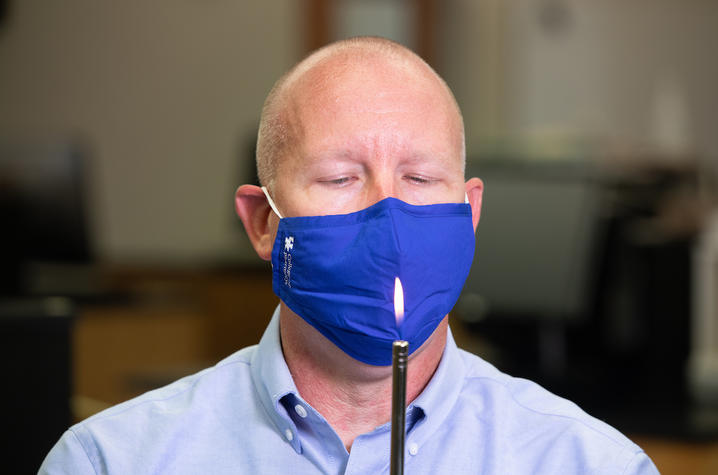Do It Yourself Test: How Effective is Your Face Mask?

LEXINGTON, Ky. (Sept. 4, 2020) — Wearing a mask is required on University of Kentucky's campus to help prevent the spread of COVID-19. But is the mask you're wearing each day enough to protect you? Craig Martin, professor of Pharmacy Practice and Science and UK College of Pharmacy (UKCOP)'s associate dean for operations, tests the most popular masks to determine which are most effective.
Martin demonstrated using a 3-ply mask, a paper mask and a neck gaiter. This experiment is not meant to be scientific. Instead, it is meant to serve as an example of a way that you can measure the efficacy of your mask in your own home with common household supplies.
UKNow: How do masks help prevent the spread of COVID-19?
Martin: The COVID-19 virus is carried through respiratory particles. When you speak, sing, shout, cough or sneeze, particles are carried out of your mouth and nose. Those particles have virus in them. This is why social distancing is so important. Particles will carry in the air for a few feet and generally fall, but someone next to you could breathe them in. A mask decreases the amount of virus that comes out of the particles in the air, thus reducing the number of particles someone is expelling into the air.
Wearing a mask not only protects you, it protects others, too.
UKNow: Some people say wearing a mask all day is uncomfortable and they worry that wearing one will make them sick.
Martin: The masks that are most effective are not going to be the most comfortable to wear, as they are generally thicker, making it seem harder to breathe. However, the likelihood that you have a significant medical event because of your mask is very low.
People in various professions have been wearing masks for years. Surgeons wear masks for hours on end and it doesn't cause any problems. On the other hand, there are people who have medical conditions that make wearing a mask more difficult. The best thing for those folks to do is to stay home, but if they need to go out, wear a mask and look for situations where they can take them off and remain socially distant.
With regard to any concern about continually breathing in your own air that may be infected with COVID-19, if you're infected, you're infected. Re-breathing that is not going to put you at a greater risk. In fact, it's a benefit to other people that the virus stays around you and that fact greatly outweighs the potential risk of you not wearing a mask at all.
UKNow: With a variety of masks on the market, which one is best to invest?
Martin: First off, we must reiterate that any mask or face covering is better than nothing. On the other hand, there is some variation and it's important to know that each mask offers different levels of protection. The Centers for Disease Control and Prevention (CDC) recommends you wear masks with at least two, preferably three, layers. Make sure the fabric is tightly woven
A quick and easy way to check your mask for efficacy is to hold it up to the light. Is it see-through? If so, it's on the thin side and probably not as effective. In this case, do your best to double up the fabric.
As the state’s flagship, land-grant institution, the University of Kentucky exists to advance the Commonwealth. We do that by preparing the next generation of leaders — placing students at the heart of everything we do — and transforming the lives of Kentuckians through education, research and creative work, service and health care. We pride ourselves on being a catalyst for breakthroughs and a force for healing, a place where ingenuity unfolds. It's all made possible by our people — visionaries, disruptors and pioneers — who make up 200 academic programs, a $476.5 million research and development enterprise and a world-class medical center, all on one campus.




